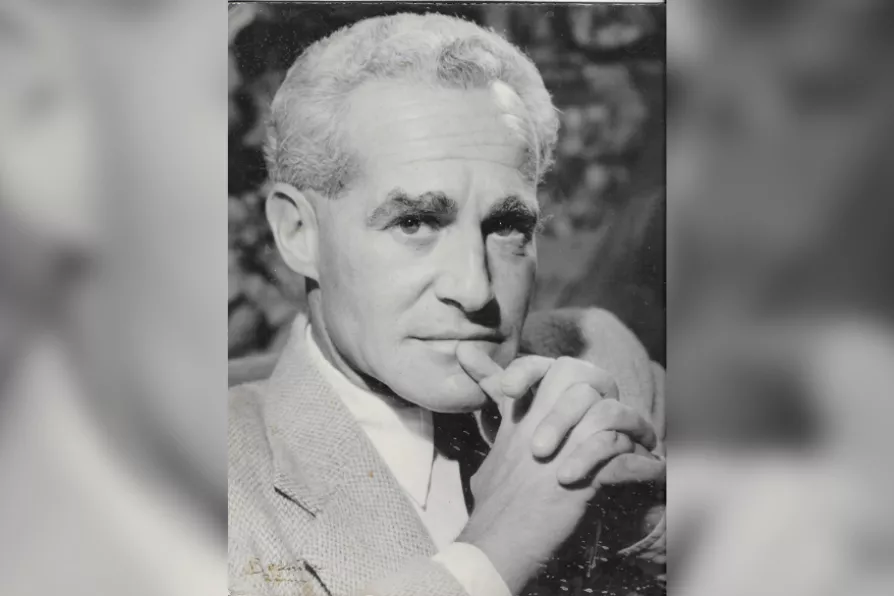John Wojcik pays tribute to a black US activist who spent six decades at the forefront of struggles for voting rights, economic justice and peace – reshaping US politics and inspiring movements worldwide
NICK MATTHEWS previews a landmark book launch taking place in Leicester next weekend

 DISTINGUISHED: Portrait of Hans Hess c1962 (photographer unknown)
[Anita Halpin]
DISTINGUISHED: Portrait of Hans Hess c1962 (photographer unknown)
[Anita Halpin]
ON Saturday June 28, Leicester Museum and Art Gallery will host a landmark event — the launch of Hans Hess: Selected Writings, published by Manifesto Press. This gathering celebrates more than just two meticulously researched and richly illustrated volumes; it honours the extraordinary life of a Marxist refugee of Jewish heritage who transformed British art history, turning provincial Leicester into an unlikely stronghold of German Expressionism during the darkest days of the second world war.
From Weimar to Wartime Leicester: a life of resistance
Born in 1908 in Erfurt, Germany, Hans Hess grew up immersed in Europe’s avant-garde circles. His parents, Alfred and Tekla Hess, counted Paul Klee and Wassily Kandinsky among their closest friends — artists later branded as creators of “degenerate art” by the Nazis.
This environment shaped Hess’s dual passions: a profound artistic sensibility and an unshakable Marxist political consciousness. By his twenties, his activism and Jewish heritage made him a target of the Nazi regime, forcing him to flee Germany in the 1930s.
His exile was marked by grim irony. After finding temporary sanctuary in Britain, Hess was interned as an “enemy alien,” first on the Isle of Man and later in Canadian prison camps. These were not Nazi cells but British empire holding pens for refugees who had already escaped fascism.
Repatriated in 1942, Hess joined the Pioneer Corps, a refugee labour unit, before his 1944 appointment as assistant keeper of art at Leicester Museum and Art Gallery. There, alongside the visionary director Trevor Thomas, he would stage one of the war’s most daring acts of cultural defiance.
‘Degenerate art’ in wartime Britain
In February 1944, as Allied forces prepared for D-Day and bombs rained across Europe, Hess and Thomas unveiled Mid European Art — an exhibition showcasing the very works the Nazis had sought to erase. Franz Marc’s vibrant animal paintings, Kandinsky’s revolutionary abstractions, and Klee’s enigmatic compositions, all condemned as “degenerate,” were displayed in Leicester to public acclaim.
The exhibition was a quiet rebellion — proof that fascism could not extinguish the art it feared.
Joanna Jones, head of arts and museums at Leicester, reflects: “Thanks to our links with the Hess family and the courage of artists who fled Nazism, Leicester remains a global hub for German Expressionism.”
The city’s collection, built by Hess and Thomas, stands as a testament to their ideological mission — not to cater to elite tastes, but to reclaim art for the working class.
Art as class struggle
Hess’s curatorial philosophy was rooted in historical materialism. While contemporaries fixated on aesthetics, he interrogated art’s social function, Who was it for? Who did it empower? His writings, now republished by Manifesto Press, dissect how economic and class struggles shaped cultural production.
German Expressionism, for instance, was not merely a stylistic movement but a rejection of bourgeois norms — an attempt to speak directly to the proletariat.
This Marxist lens made Hess a polarising figure, but it also gave Leicester’s collection its radical edge. Unlike other institutions chasing prestige, Hess and Thomas acquired art with a purpose: to amplify voices silenced by fascism and to make their work accessible to all.
Today, Leicester’s German Expressionist gallery remains free to the public, a deliberate homage to Hess’s belief that art should never be a luxury.
A daughter’s legacy
For Anita Halpin, Hess’s daughter and a former chair of the Communist Party, the launch is deeply personal. Now in her eighties, she recalls a father who saw art and politics as inseparable. “He rarely spoke of the friends he’d lost,” she says, “but exhibiting ‘degenerate’ art in Leicester was his way of fighting back.”
Through the Free German League of Culture, an anti-fascist exile network, Hess turned curation into resistance.
Why Hess matters now
Geoffrey Ferres, secretary of the Communist Party in the Midlands, notes the chilling relevance of Hess’s legacy: “With the far right rising globally, his work is a blueprint for cultural resistance. These books aren’t relics — they’re tools to understand how art challenges power.”
The event: a fitting tribute
The launch on June 28 offers exclusive access to Leicester’s Expressionist gallery — a living monument to Hess’s vision. Attendees can explore the collection and acquire Volumes One and Two of his writings, with proceeds supporting Manifesto Press’s radical publishing mission.
In an age of resurgent authoritarianism, Hans Hess’s story reminds us that art is never neutral, and museums are a key battleground where the future of culture is decided.
Event Details:
• Date: June 28, 5.30pm
• Location: Leicester Museum & Art Gallery
• Tickets: Free, but booking essential via https://tinyurl.com/HH28JUN
• https://tinyurl.com/HH28JUN

JAN WOOLF ponders the works and contested reputation of the West German sculptor and provocateur, who believed that everybody is potentially an artist

The creative imagination is a weapon against barbarism, writes KENNY COYLE, who is a keynote speaker at the Manifesto Press conference, Art in the Age of Degenerative Capitalism, tomorrow at the Marx Memorial Library & Workers School in London

Paul MacGee of Manifesto Press invites you to a special launch on Saturday August 2.

JOHN ELLISON recalls the momentous role of the French resistance during WWII









